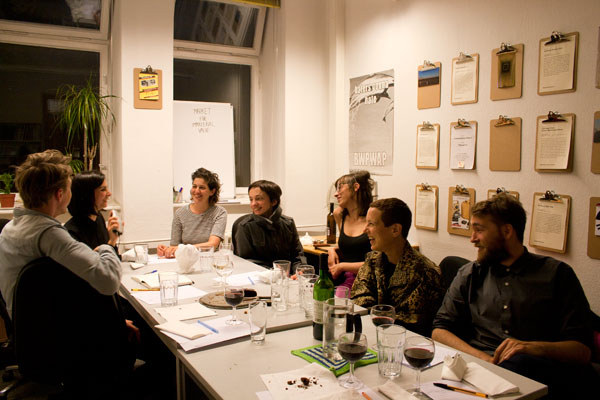The absence of objects and the presence of discussions
Federica Buetti, Daphne Dragona, Kristoffer Gansing, Gilly Karjevski, Rebekka Kiesewetter, Fotini Lazaridou-Hatzigoga, Lorenzo Sandoval
—
The art economy, even if it is about luxury goods, is not much different than the market economy of daily goods; they are both subjected to the laws of financialization and speculation. Regarding the market economy, there is a critical discussion about sharing, open source, sustainable economy and when it comes to tech platforms, platform cooperativism. Can we imagine an equivalent of the sharing economy in the arts and how to apply such a model without falling under startup commercialization?
Moreover, how can we step away from what we are so much indoctrinated in, in order to create something new? Maybe starting with changing the terminology or inventing a new language could help. Immaterial labor is symptomatic of an entire system in which work does not have a physical outcome, but it is performance. Is immaterial value referring to the discourse of immaterial labor and therefore creating an ironic concept since the financial system already commodifies immaterial labor? Or is immaterial value something that cannot be translated into something else outside of itself and therefore is not exchangeable? Perhaps a concept of anti-value could be elaborated here, but carefully, because not only existence but also absence can be captured value.
—
—
Daphne Dragona is a curator, writer and researcher living and working in Athens and Berlin. Since 2001, she has been collaborating with centers, museums and festivals in Greece and abroad for exhibitions, conferences, workshops and media art events. Among them are the National Museum of Contemporary Art (Athens), LABoral Centro de Arte y Creacion Industrial (Gijon), Alta Tecnologia Andina (Lima), Goethe-Institut Athen and the Hybrid City Conference organised by the University of Athens. She has worked extensively on game art, net and network based art as well as on artistic practices connected to the urban and digital commons. Her current research and curatorial practice particularly involves critical data-driven art, playful exploits and off-the-cloud initiatives, explored as tools for users’ empowerment and emancipation. Articles of hers have been published in numerous books, journals and magazines. She was among the main curators of Transmediale 2015 – ‘Capture All’.
Kristoffer Gansing is the artistic director of transmediale – festival for art and digital culture, Berlin. For the past 15 years he’s been working as a cultural producer, artist and media researcher at the intersection of film, net culture and urbanism. He is co-founder of The Art of the Overhead (2005) and 2007-2010 was an editorial board member of artist-run channel tv-tv in Copenhagen. Between 2001 and 2011, he taught the theory and practice of new media at the K3, School of Arts and Communication, Malmö University. In 2013 he completed his PhD thesis, entitled Transversal Media Practices, a study dealing with media archaeology, art and technological development.
Gilly Karjevsky is a curator working at the intersection of art, architecture and the politics of urban society. Gilly is co-director of 72 Hour Urban Action, an international rapid architecture competition, and founded the City Artists Residency program, A platform for artistic intervention in local politics in Israel. She regularly give talks and lectures on curating as an urban practice. Gilly holds an MA in Narrative Environments from Central Saint Martins college in London. She serves on the international boards of the ZK/U, centre for art and urbanistics residency program and ArtCube – studios residency program in Jerusalem. Early in her career Gilly directed Bat-Yam’s museum Education and Community department and worked as associated curator at the Bat-Yam Bienniale for Landscape Urbanism. Other notable projects have included “Glocal Neighbours” a program for inter-neighbourhood knowledge exchange. Her newest project, Playful Commons, sets out to explore what kind of licenses administrators and users of public spaces can agree on when it comes to allowing a commons approach towards management of public space.
Rebekka Kiesewetter is, among other things, a team member of Depot Basel. Within all of her projects/collaborations – be it the making of books, exhibitions, researches, discussions and similar formats – she understands herself as a unifier, funnel, catalyst and disseminator.
Fotini Lazaridou-Hatzigoga works between the realms of art, architecture and urban research to explore the possibilities inherent in the intersections between social and physical spaces. Such context specificity finds working manifestation in curation, artistic production and collaborative organization, all of which point to an interest in structure as a dynamic of being and working together. In 2006 Fotini co-founded PROGRAM – initiative for art and architecture collaborations in Berlin, and she was one of the organizers of HomeShop, an artist-run space in Beijing, active from 2008-2013. She was a fellow at the Institut für Raumexperimente in 2012-2013, and has been part of the organizing committee of The Public School Berlin since 2010.
www.otherspaces.net
Sandoval works in the crossing points of artistic practice, curatorial processes and spatial design. He holds a B.F.A and a Masters in Photography, Art and Technology from the UPV (Valencia, Spain). Sandoval has attended international residencies in Berlin, Portugal and Kenya. He was production manager of the EACC (Castellón, Spain). Within Transeuropa Festival, Sandoval organized the project ‘Visualizing Transnationalism’ together with Emanuele Guidi. Sandoval has won several curatorial prizes such as: Inéditos, with ‘Around Is Impossible. An Exploration Of The Unexpected In the Cartographical Systems Of Goggle’, in La Casa Encendida (2011), The Can Felipa Curatorial price with ‘(…) Science, Territory and Subjective Narratives‘ and Curatorial open call 2012 with ‘Case Report‘ in Nogueras Blanchard. He has curated ‘The Rescue of the Effects, Notes For a Theory of The Reader‘ at General Public (2012); ‘Field Studies‘ (2012), ‘Osmosis‘, together with Gabriela Acha, ClubTransmediale Vorspeil and ‘Disruptive Patterns. Plans, Plots and Movements‘at Altes Finanzamt. He has participated in shows such as at ‘<Circuito:Berlin>‘ at Instituto Cervantes (2012), ‘Say it Loud. On Words and Actions‘ at District (2012) and ‘Handlungsbereitschaft‘, Motorenhalle, Dresden, (2013). He presented the project ‘Office Party. Multidimensional Spectrum of Voices‘ at Rosa Santos Gallery (Valencia) and Kinderhook&Caracas (Berlin). In collaboration with Susanne Husse, he has developed ‘dissident desire‘ at District (Berlin). ‘Mutant Matters’, produced together with S.T.I.F.F., was commissioned by Savvy Contemporary (Berlin) and presented at ar/ge Kunst (Bolzano). At the moment, Sandoval is developing project ‘Spaces of Anticipation‘ with Emanuele Guidi for EACC and ar/ge Kunst.
—




